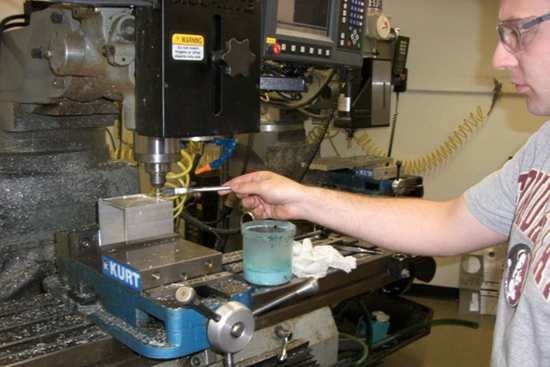BU Satellite Team Looking for a Few Good Engineers
Calling all engineers for Air Force satellite competition

If you’re interested in space physics and have an engineering background, the BU Student-satellite for Applications and Training project (BUSAT) team wants to hear from you. The team is in the early stages of a competition to design and build a weather satellite for the Air Force and is looking for students to participate.
The competition is sponsored by the University Nanosat Program (UNP), which is jointly run by the Air Force Office of Scientific Research, the Air Force Research Laboratory’s Space Vehicles Directorate, and the American Institute of Aeronautics and Astronautics. Every two years, UNP pits 11 universities against one another in a showcase of engineering know-how. The universities compete to make the best weather satellite. Participating BU students are asked to make a two-year commitment, since it takes that long to complete the concept-to-flight-ready spacecraft competition. The winning satellite is then launched into orbit.
The University Nanosat Program began in 1999, and BUSAT was among those competing in the first competition. Since its inception, 27 institutions and 4,500 students have been involved in the program, whose objective is to train the next generation of space professionals. Other schools that have participated are MIT, Santa Clara University, Texas A&M, and Michigan Tech University, the winner of the 2009-2011 competition.
BUSAT has already pitched its concept to the UNP and is moving on to more specific design proposals. However, the group’s next step could be its toughest one: finding more students to participate.
“Anyone can participate, as long as they interested in it for the long run,” says BUSAT project manager Nathan Darling (ENG’13). “We have grad students, undergraduates, and faculty members working together on the project.”
Because of the demands engineering students face during the academic year, much of the BUSAT work takes place at the end of spring semester. “We’re looking for 30 students who can work over the summer,” says Darling. “All disciplines can help out. We have mechanical engineers, electrical engineers, and biomedical engineers as of now.”
As project manager, Darling is responsible for finding project sponsors to help underwrite the team’s satellite design and construction costs. Each university gets a $110,000 UNP grant over the course of the two-year competition, but costs can run as much as $300,000. Darling says the University has been generous in the past in supporting the team, as have companies that include Alstom, which specializes in transportation sciences, and Scadata, a communication and data technology company. Companies like these, he says, provide BUSAT with technology essential to developing the satellite.
Building a satellite that meets the rigorous research and design standards laid out by UNP is a complex task. The satellite has 14 different subsystems and uses space industry technology in such components as altitude control to monitor the satellite’s orbital positioning, solar arrays to provide the satellite with postlaunch power, and a ground control system to operate the satellite and receive satellite data.
The task of building a spacecraft might seem daunting to many students, but Darling assures students that they don’t need any experience in the field. “Before I joined BUSAT, I didn’t know much about space physics,” he says. “I’m sort of taking my own crash course.”
The competition offers a rare opportunity for hands-on experience, he says. “How often do you get to work with real space launch equipment? We get to build this satellite. We can make this happen.” The competition, he says, offers a chance to have an impact on the space industry. “We have real industry-level goals. It could eventually show up in industry hardware.”
The winner of the 2011-2013 competition will be announced in January 2013.
More information is available here or email Professor Theodore Fritz at fritz@bu.edu or Nathan Darling at thomas77@bu.edu. Interested in joining? Email to Darling to schedule a meeting.
John Fichera can be reached at jfichera@bu.edu.
Comments & Discussion
Boston University moderates comments to facilitate an informed, substantive, civil conversation. Abusive, profane, self-promotional, misleading, incoherent or off-topic comments will be rejected. Moderators are staffed during regular business hours (EST) and can only accept comments written in English. Statistics or facts must include a citation or a link to the citation.